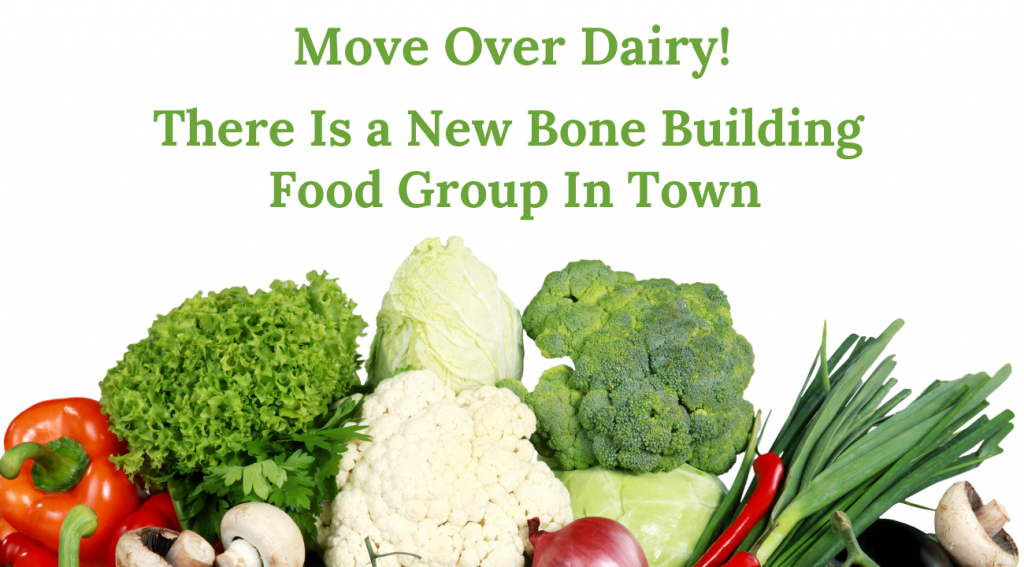When you hear the word Osteoporosis, what’s the first food that comes to mind? Dairy. For years it has been drilled into us to eat more dairy and drink more milk to protect our bones. However, I disagree. In my opinion vegetables and fruits are the most important foods for building strong, healthy bones.
Certainly, dairy products like milk, cheese, and yogurt are a great source of calcium. Calcium is important for bone health, but our bones need so much more than just calcium to keep them strong, and calcium alone is not enough. Our bones need over 20 different nutrients for proper bone metabolism and there is increasing evidence that vegetables and fruits support our bones in ways that dairy doesn’t.
-
A 2015 study published in the journal Nutrients showed an increase in fruits and vegetables had a positive effect on bone health by reducing bone turnover and urinary calcium loss in post-menopausal women.
-
A 2016 study published in the Journal Bone MIneral Reserach showed that consuming less than 5 servings of fruits and vegetables a day was associated with a high risk of fractures, particularly in older women.
-
A 2021 study published in the Journal of Nutrition showed that a diet with a greater intake of vegetables was associated with improved bone metabolism, a decrease in bone resorption, and reduced loss of acid and calcium in the urine.
There are several mechanisms through which vegetables and fruits have a positive effect on bone health.
1. Vegetables and fruits contain many of the essential nutrients, beyond calcium, that our bones need to stay healthy. Dark leafy green vegetables in particular (think spinach, kale, etc.) are a rich source of minerals, not only calcium but also magnesium, zinc, manganese, copper, and potassium. Many different fruits and vegetables are great sources of important bone health vitamins such as vitamin A, C, and K.
2. Vegetables and fruits are rich sources of polyphenols, flavonoids, and carotenoids. All of these plant compounds have antioxidant and anti-inflammatory properties. Many diseases have been linked to oxidative stress and inflammation, including osteoporosis. These plant compounds can protect our bones from oxidation and inflammation that can stimulate excessive bone loss.
3. Vegetables and fruits can help balance out acid in the body and reduce the loss of calcium in the urine. Foods such as meat, poultry, dairy, eggs, and wheat are all considered to be acidic foods that can stimulate osteoclasts (cells that break down bone) leading to calcium loss in the urine and increased risk of bone loss. Because vegetables and fruits are alkaline-rich foods, they help to balance out and decrease the dietary acid load from other foods and reduce urinary calcium excretion and bone loss.
4. Vegetables and fruits support a healthy gut microbiome. Foods high in fiber like vegetables and fruits supply prebiotic fibers that nourish our gut microbes and allow them to thrive. They have also been shown to improve the diversity of bacteria in our gut. A greater diversity of bacteria in the gut microbiome is directly correlated with gut and overall health and well-being. Gut microbes can increase bone mass and improve osteoporosis by inhibiting osteoclast and promoting osteoblasts (bone-building cells).
I generally recommend that people aim to get 7-10 servings of vegetables and fruits a day, with twice as many vegetables as fruits. I know the idea of getting this quantity in a single day may sound a little overwhelming, but I promise you that it is actually easier than you think!
A serving size of most vegetables and fruits is only a 1/2 cup. A serving size of leafy greens is a cup.
If you are having a bowl of fruit in the morning with your breakfast you are most likely getting 2 servings of fruit. A large salad at lunch with 2 cups of leafy greens, 1/2 cup each of peppers, cucumbers, and tomatoes will give you another 5 servings. So before you even sit down for dinner, you have already had 7 servings and it should be easy to get another 2-3 servings in at dinner.
Still overwhelmed? Here are 3 simple tips you can follow:
1. Strive to get fruits and/or vegetables with every meal of the day.
2. Make vegetables and fruits the focus of every meal. When you are dishing out your plate, make 1/2 of your plate vegetables and/or fruits, 1/4 of your plate protein, and 1/4 of your plate complex carbohydrates like grains or legumes. Not only will this ensure you get your daily dose of fruits and vegetables but will also provide you with a healthy and well-rounded meal.
3. Change your thinking. Instead of thinking about “what should we have with our chicken/fish/lentils for dinner,” think “what should we have with our broccoli/cauliflower/greens/beets for dinner.” Build your meal around the vegetables instead of the protein.
For the longest time we have been so focused on consuming dairy for bone health. However, it is becoming increasingly evident that vegetables and fruits are just as important and arguably maybe even more important than dairy for maintaining bone health.
So, move over dairy there is a new food in town for building strong, healthy bones!
If you have any questions or need help putting together and bone-building diet, please reach out. I am always happy to help you build strong, healthy bones.
Contact me at: susan@nurturedbones.com or 703-738-4230
References:
2. Fruit and Vegetable Intake and Hip Fracture Incidence in Older Men and Women: The CHANCES Project







